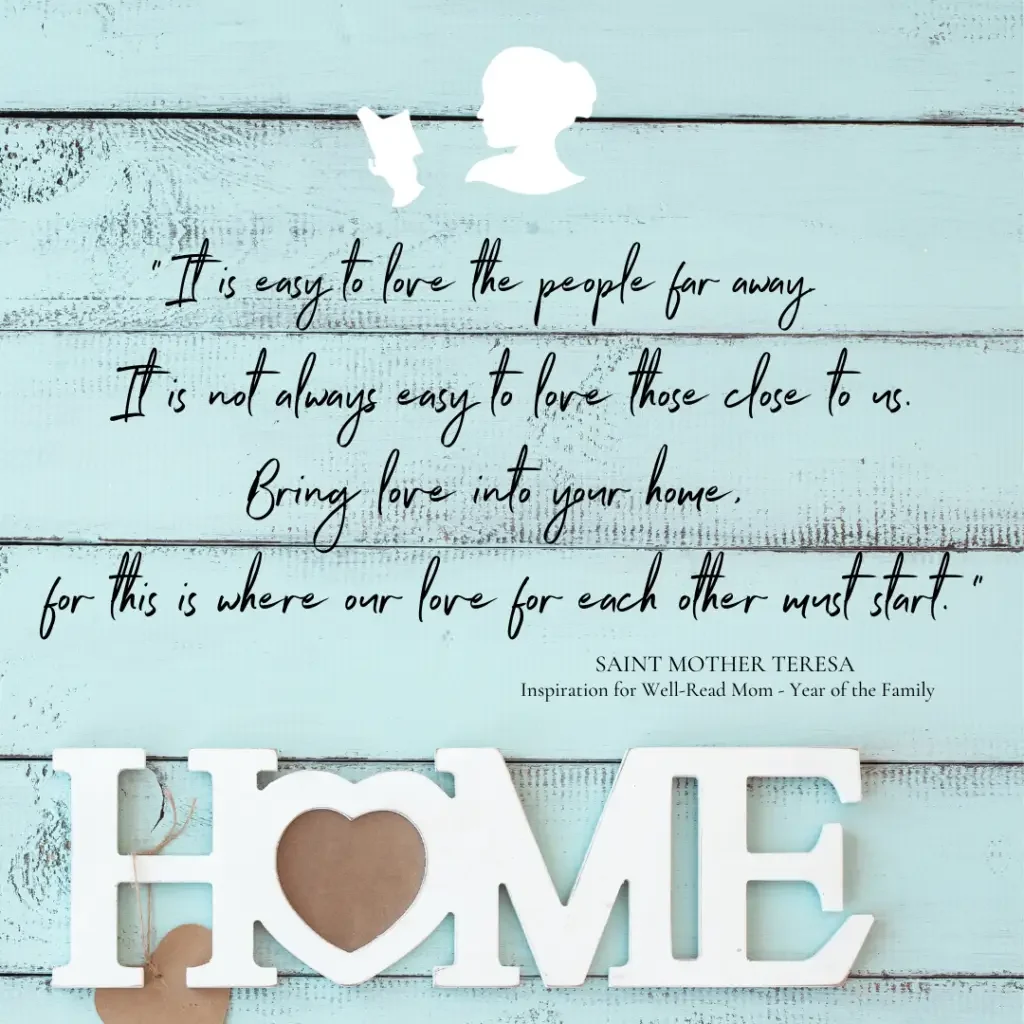Home: Bearing with One Another Through Love
a Well-Read Mom blog post by Megan Keyser
“What does it mean to come home?”
When many of us consider an ideal home, we envision a place of beauty, order, and pleasantness. A place of relaxation and happiness, where troubles are mollified, and we find respite from worldly cares. Lifestyle magazines, television programs, and books center on crafting our abodes into bastions of peace, tranquility, and loveliness via means of conscientious decluttering, careful organizing, and perfected decorating. And while there is nothing inherently wrong with creating households that tangibly reflect our unique personalities and our natural desire for order and rest, particularly as such aspirations often prompt gracious sentiments of gratitude, hospitality, and serenity within homemakers, the tidiness and aesthetic appeal of a dwelling does not instantaneously transform it into an authentic home.
In Marilynne Robinson’s Home, the chief characters grapple with understanding the significance of home, and Glory specifically wonders: “What does it mean to come home?” (page 102). Struggling under the burden of her own disappointed plans, Glory Boughton finds her childhood home anything but comforting or satisfying, as she inwardly recoils from the outdated furniture, the clutter of knick-knacks, the perpetual “sameness” of it all, and most acutely, from the feeling of loneliness pervading a house filled with memories, many of them painful, but largely devoid of the faces and persons that once brought it joy. The Boughton home starkly contrasts to the perfectly ordered life Glory had once envisioned for herself – a home with the “perfect” number of well-behaved, quiet children, blissfully coexisting with their parents in a house unrattled by chaos, disruptions, or complications (102 and 306). But while such a home sounds lovely in theory, when we consider that human life is inundated with troubles, conflicts, temptations, and complexities, is such a place remotely possible? And when weighed in the context of Christian understanding, is such a placid existence truly advantageous for spiritual growth or the cultivation of sincere love – self-giving love which should permeate our hearts, our homes, our families, and our communities? If Christ provides the ultimate example of devotion, how can human love possibly achieve fulfillment without exacting a certain amount of suffering from the lover?

Saint Paul’s description of love, contained in 1 Corinthians 13: 4-8, remains a most glorious expression of Christian love:
“Love is patient, love is kind. It is not jealous, it is not pompous, it is not inflated, it is not rude, it does not seek its own interests, it is not quick-tempered, it does not brood over injury, it does not rejoice over wrongdoing but rejoices with the truth. It bears all things, believes all things, hopes all things, endures all things. Love never fails.”
Though it’s hardly surprising that pleasure, beauty, calm, and happiness are incredibly alluring and, subsequently, tend to eclipse our focus on matters of eternal import, it is so vital that we, as Christians, recapture the significance of enduring through the trials and crosses of life for the sake of love. By bearing with each other through the myriad of complications, temptations, and frustrations of this earthly existence, we not only fashion ourselves after Christ, but we also embrace authentic human relationship “with all humility and gentleness, with patience, bearing with one another through love” (Ephesians 4:2). And what better place to truly bear with each other’s afflictions and sorrows than in the intimacy and loyalty of the family? The Reverend Boughton speaks to the indispensable role of the family when he reflects:
“But the Lord does work through human beings, through families…Part of it is giving care and another part is accepting it. The second part is difficult and very important. I know I’ve been a burden to everybody for years and years, and you all have been very good to me. And I’ve enjoyed that, even though I never enjoyed the suffering and the general uselessness that made it necessary….it is the Providence of God that we look after those nearest to us. So it is the will of God that we help our brothers, and it is equally the will of God that we accept their help and receive the blessing of it”
Home by Marilynne Robinson (261)
And while parenthood undoubtedly has its delights, it would be naïve to dismiss the trials encapsulated in Reverend Boughton’s honest lament: “Why do I have to care so much? It seemed like a curse and an affliction to me. To love my own son. How could that be?” (273) Caring for others hurts, because authentic love takes the sufferings of others and compels us to share in their pains. So, while there is a certain liberty found in isolation and anonymity, where the self is one’s sole concern, the loss of relationship with others simultaneously robs us of the indescribable joys of love – blessings which can only be the fruit of suffering: “…When I think what it is that brings us to our Father, it might be grief or sickness – trouble of some sort. Weariness. And then there we are, and it’s a good thing at such times to know we have a Father, whose joy it is to welcome us home…So there is a sadness even in great blessing…” (41)
When discussing Home with my own Well-Read Mom group, many of us felt disappointed by the lack of resolution and familial harmony that marked the novel’s conclusion. While I believe we should certainly aspire to greater levels of personal sanctity, domestic unity, and collective peace within our own homes than that exhibited in the novel, I also believe that we should derive a certain amount of comfort and understanding from the very realistic, and even raw, portrayal of a family that, despite their heartfelt efforts, still struggles with spiritual turmoil, and even despondency, as each member wrestles, not only with their own personal failings and foibles, but the difficulties of meeting each other’s deepest needs. We should strive for the ideal, but when we, like the Boughtons, are met with the imperfections of life and are confronted by the ramifications our own sins and those of our parents, siblings, children, or spouses, we need to take up the cross of genuine fellowship and solidarity, remembering that, however hopeless a situation or person may seem, nothing is beyond God’s reach and no person is beyond redemption. Until we draw our final breath, each of us is on a great spiritual odyssey, a journey which, despite differences in duration or difficulty, temptation or triumph, will hopefully culminate in our arriving before the Beatific Vision of Christ: He Who lovingly, yet painfully, embraced the grim realities of Mount Calvary to offer us our true and everlasting Home.
“Weary or bitter or bewildered as we may be, God is faithful. He lets us wander so we will know what it means to come home.”


